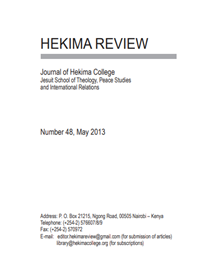A Theological interpretation of the second Vatican Council (1962 -65): Meaningful Faith Today
Keywords:
Vatican II, Faith, Today, TheologyAbstract
Defined by the task of interpreting revelation to a changing context and vice versa, Fundamental Theology stands at the crossroads of various theological disciplines and beyond theology in order to give a renewed and reasoned “account of the hope that is in us” (1 Pet 3: 15). The interpretive work of the second Vatican council made use of scientific and philosophical data of the time within its own Tradi-tion, and came up with the conclusions here summarized through nine classic theological topics. How accessible and credible is God’s self-gift in Jesus Christ? The answer to this question is: in the power of “friendship.” It is appealing to know that God wants to make friends with us (Dei Verbum, 2) and to persuade us in Christ that friendship with one another is true source of happiness. Faith is then practical commitment to universal brotherhood in an amicable religious spirit. Through the Church we have full access to the reality of Christ who values our evolving cultures in this world, which God astound-ingly loves (Jn 3:16). God the creative mysterious intimacy is also accessible in culture and other religions. The newness in this Council is an increased confidence in God. All traditional areas of the theological endeavor have been subtly or radically reviewed in the light of this concept of friendship: (1) Method, (2) Anthropology, (3) Ecclesiology, (4) Pneumatology, (5) Christology, (6) Doctrine of God, (7) Soteriology, (8) Ethics, (9) Eschatology, and even (10) Scripture Study - that is “as it were the soul of sacred theology.” What then makes the council credible enough for coercion-free reception? Jürgen Habermas may speak better to the “cultured & atavistic despisers” of Vatican II.
Downloads
Downloads
Published
Issue
Section
License
Copyright (c) 2024 Hekima Review

This work is licensed under a Creative Commons Attribution-ShareAlike 4.0 International License.


